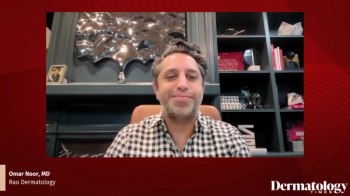
Omar Noor, MD, discusses how pain and functional impairment define CHE and reviews why topical delgocitinib provides early symptomatic relief and improved adherence.

Omar Noor, MD, discusses how pain and functional impairment define CHE and reviews why topical delgocitinib provides early symptomatic relief and improved adherence.

Omar Noor, MD, outlines the complex phenotypes, variable presentations, and functional burdens of chronic hand eczema and explains why a broader JAK-targeted strategy may offer therapeutic advantages.
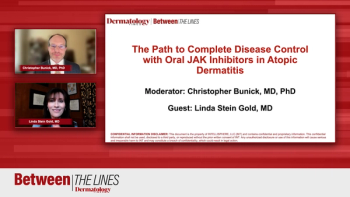
Panelists discuss how effective patient onboarding and education enable smooth integration of JAK inhibitors into clinical practice for long-term success.
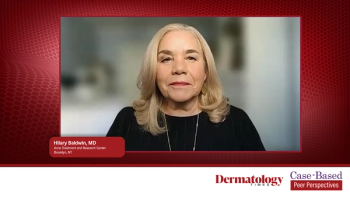
Hilary Baldwin, MD, introduces the series and reviews acne pathogenesis, mechanisms of topical therapies, and key barriers to adherence in everyday practice.

Panelists discuss how JAK inhibitors demonstrate long-term safety and broad clinical utility across patient populations when guided by careful monitoring.

Hilary Baldwin, MD, introduces the series and reviews acne pathogenesis, mechanisms of topical therapies, and key barriers to adherence in everyday practice.
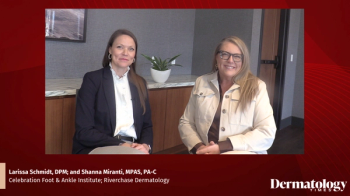
At Elevate-Derm, Shanna Miranti, MPAS, PA-C, and Larissa Schmidt, DPM, outlined how interdisciplinary education, shared therapeutic advances, and evolving career pathways are strengthening the connection between dermatology and podiatry.

At Elevate-Derm 2025, Lisa Weiss, MMSc, PA-C, outlined the multifactorial approach to CHE, the clinical utility of delgocitinib, and her expanding educational and leadership priorities heading into 2026.

Michael Lewitt, MD, reassures patients that topical ruxolitinib shows minimal systemic absorption despite sharing a mechanism with oral JAK inhibitors.
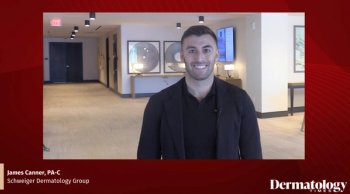
James Canner, PA-C, outlines key updates in acne therapeutics, alopecia management, and rheumatology–dermatology collaboration presented at Elevate-Derm Fall.

Discover the latest advancements in botulinum toxins, including TrenibotE's rapid effects and onabotulinumtoxinA's consistent results for aesthetic treatments.
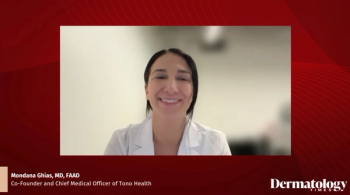
Tono Health revolutionizes virtual dermatology by enhancing specialist access for HS and oncodermatology care, while prioritizing the doctor-patient relationship.

Mondana Ghias, MD, FAAD, discusses Tono Health's role in improving access to skin care for patients of color, addressing systemic barriers and enhancing diagnostic accuracy.
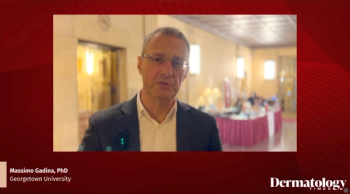
Massimo Gadina, PhD, underscored the need for genetics-guided patient selection to improve treatment specificity in inflammatory skin diseases.

Panelists discuss how dermatologists should expand their therapeutic scope beyond traditional steroids and calcineurin inhibitors to embrace newer nonsteroidal options, while emphasizing that treating pediatric atopic dermatitis requires the same principles as adult care and encouraging broader provider participation, including pediatricians, to address access challenges.

Panelists discuss how future therapies should aim to provide faster symptom relief than the current 4- to 8-week timeframe, offer longer-lasting depot effects requiring less frequent application, and accelerate the regulatory process for extending safe adult medications to younger pediatric populations.

At Elevate-Derm Fall, Ken Korber, PA-C, MHPE, DFAAPA, highlighted how literacy-aware communication and team-based collaboration can elevate patient understanding, adherence, and outcomes.

Michael Lewitt, MD, emphasizes adherence to twice-daily application as the primary determinant of clinical success.

At Elevate-Derm Fall, Ted Rosen, MD, detailed how rapidly evolving resistance in bacteria, fungi, viruses, and more is reshaping therapeutic choices.

Clinicians can enhance aesthetic outcomes by proactively managing GLP-1 patients' expectations, addressing facial changes early, and integrating holistic treatment strategies.

Hilary Baldwin, MD, introduces the series and reviews acne pathogenesis, mechanisms of topical therapies, and key barriers to adherence in everyday practice.

Panelists discuss how switching from biologics to JAK inhibitors offers rapid, meaningful improvement and restores disease control for patients with persistent atopic dermatitis.

At Elevate-Derm 2025, Diego Ruiz Dasilva, MD, emphasized cross-role teamwork and urged clinicians to consider positive JAK inhibitor safety data.

A panelist discusses how evolving safety evidence and real-world considerations will shape clinician confidence and best practices for oral systemic therapies.

Using multiple treatment modalities often achieves superior repigmentation compared with monotherapy, according to Michael Lewitt, MD.

GLP-1 medications are reshaping dermatology, driving increased patient demand for treatments addressing facial volume loss and jowling concerns, according to Joely Kaufman, MD.

Neuroimmune modulation, including vagus nerve stimulation, is highlighted as a promising strategy for patients unresponsive to biologics.

At Elevate-Derm, Buchi Neita, PA-C, discussed treatment expectations for vitiligo, triple-combination cream for acne, early diagnosis in HS, and what she’s looking forward to in the 2026 pipeline.

At Elevate-Derm Fall, Patricia Delgado, DNP, AGPCNP, DCNP, PMHNP, outlined practical ways dermatology clinicians can incorporate psychodermatology principles and previewed the upcoming Psych and Skin video series.

Lisa Weiss, MMSc, PA-C, and Justin Love, PA-C, discuss the importance of broad differentials, repeat biopsies, and national networking to strengthen diagnostic accuracy and provider support at Elevate-Derm Fall.